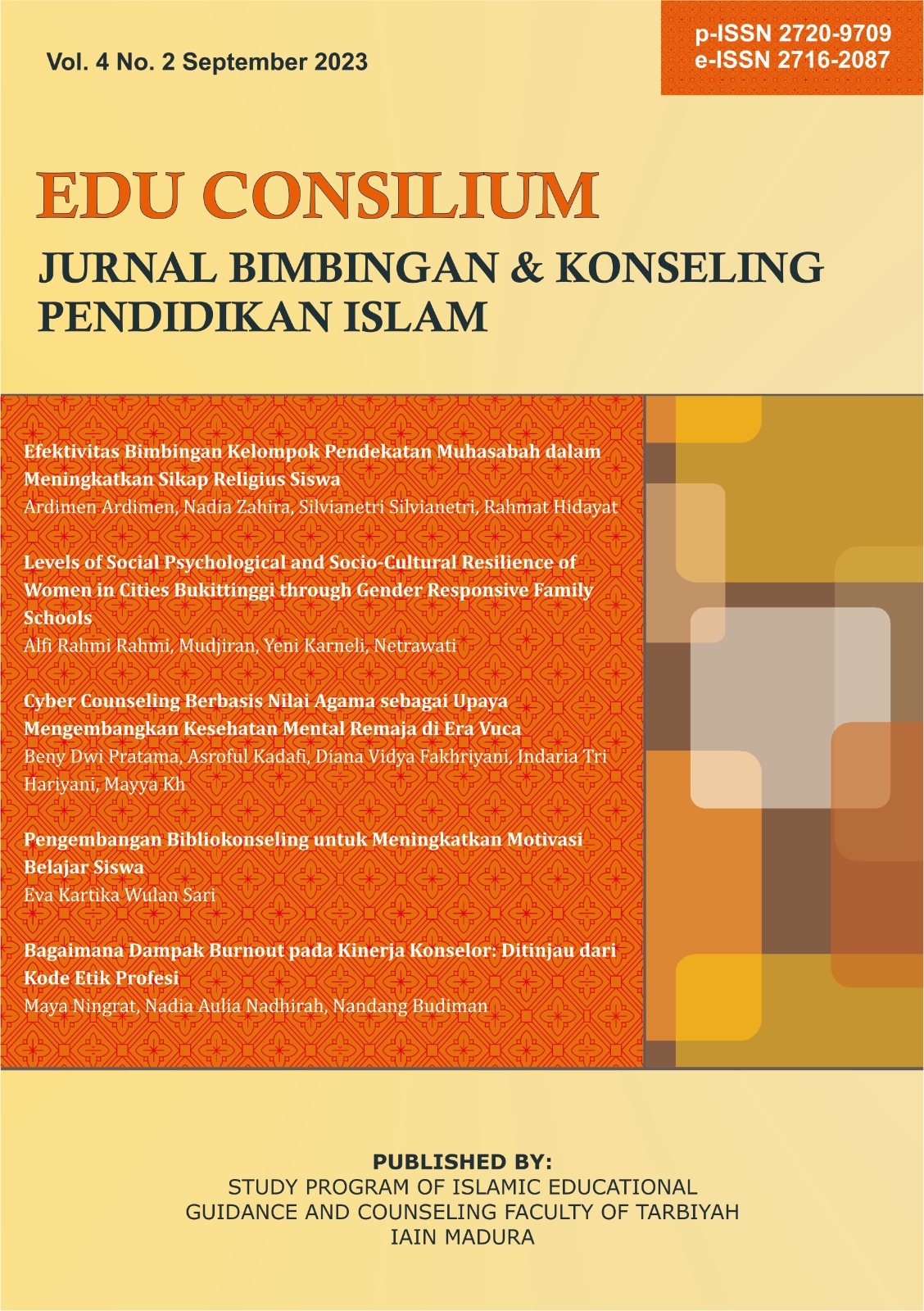Bagaimana Dampak Burnout pada Kinerja Konselor: Ditinjau dari Kode Etik Profesi
 Abstract views: 526
,
Abstract views: 526
,
 PDF downloads: 592
PDF downloads: 592
Abstract
The profession of a counselor has responsibilities and job demands that require you to remain professional in carrying out your duties. The large number of work demands that must be carried out by the counselor is the cause of burnout so that it can have an impact on the counselor's performance. This study aims to identify the factors that cause burnout in counselors and the resulting impact seen from the counselor's performance when carrying out their duties. The method used in this research is a systematic literature review (SLR) by presenting some of the results of previous research originating from journal articles on Google Scholar so that five relevant previous studies are obtained. Based on five previous studies, it was found that counselors are prone to experiencing burnout due to work demands factors related to different counselee problems and a lack of social support. Counselors who experience burnout are marked by feeling emotionally exhausted then experience a depersonalization stage and at the final stage are characterized by low self-esteem. The impact of burnout on counselor performance from several previous studies has shown a decrease in counselors even becoming unprofessional in providing services to counselees. This is not in accordance with the professional code of ethics regarding the principles of professionalism that must be possessed by counselors in carrying out their duties by respecting and providing the best service for counselees.
Downloads
References
Ani Aufa. (2014). UPAYA PREVENTIF GURU BIMBINGAN. Jurnal Hisbah, 11(1).
Avionela, F., & Fauziah, N. (2017). Hubungan Antara Kecerdasan Emosi Dengan Burnout Pada Guru Bersertifikasi Di Sma Negeri Kecamatan Bojonegoro. Jurnal EMPATI, 5(4), 687–693. https://doi.org/10.14710/empati.2016.15440
Cholilah, I. R., Djalali, H. M. A., & Rini, A. P. (2018). Pengaruh pelatihan manajemen relaksasi terhadap penurunan burnout pada perawat Rumah Sakit Daerah Kalisat Jember. Seminar Nasional Dan Call for Paper: “Community Psychology,” 1, 82–107.
Christiana, E. (2020). Burnout Akademik Selama Pandemi Covid 19. Prosiding Seminar Bimbingan Dan Konseling, 0(0), 8–15. http://conference.um.ac.id/index.php/bk2/article/view/74
Ekawanti, S., & Mulyana, O. P. (2016). Regulasi Diri dengan Burnout pada Guru. Jurnal Psikologi Teori Dan Terapan, 6(2), 113. https://doi.org/10.26740/jptt.v6n2.p113-118
Elaman, G. E. (2010). Faktor-Faktor yang Mempengaruhi Burnout Guru Bimbingan dan Konseling di Ambon. Jurnal Psikologu Iniversitas Persada Indonesia, 1(1).
Fariza, D., Syarif, T., & Fatchurahman, M. (2022a). Pelatihan Self healing Untuk Mengurangi Burnout Konselor Sekolah. Jurnal ABDINUS: Jurnal Pengabdian Nusantara, 6(1), 178–188.
Fariza, D., Syarif, T., & Fatchurahman, M. (2022b). PENGEMBANGAN SKALA BURNOUT KONSELOR DI KALIMANTAN TENGAH COUNSELOR BURNOUT SCALE DEVELOPMENT IN CENTRAL KALIMANTAN. Suluh: Jurnal Bimbingan Dan Konseling, 8, 1–10.
Fatmawati, R. (2017). Burnout pustakawan : Faktor-faktor dan dampak. Jurnal Perpustakaan, Arsip Dan Dokumen, 9(1), 103–114.
Habibah, S. (2019). Kondisi Burnout pada Guru BK / Konselor di Sekolah Menengah Atas Negeri Kota Pekanbaru dan Implikasinya Bagi Peran Kepala. Educational Guidance and Counseling Development Jounal, 2(2), 66–72.
Habsy, B. A. (2017). Filosofi Keilmuan Bimbingan Dan Konseling. Jurnal Pendidikan, 2, 1–7. https://journal.unesa.ac.id/index.php/jp/article/viewFile/584/724
Harahap, A. P., Rojwa Darus, A., Azizah Siregar, M., & Rahmadana, W. (2022). Analisis Pemahaman Kode Etik Profesi Konseling Pada Guru Bimbingan dan Konseling di MAN Alya Rojwa Darus Mutiara Azizah Siregar. Jurnal Bikotetik, 6(2), 1–10.
Harnany, L., & Putra, F. W. (2021). Burnout Pada Guru Sekolah Dasar Fullday : Menguji Peranan Kecerdasan Emosional dan Dukungan Sosial. Nathiqiyyah, 4(1), 1–17. https://doi.org/10.46781/nathiqiyyah.v4i1.173
Hartawati, D., & Mariyanti, S. (2014). Hubungan Antara Self-Efficacy Dengan Burnout Pada Pengajar Taman Kanak-Kanak Sekolah. Di Jakarta Jurnal Psikologi, 12, 54. https://www.esaunggul.ac.id/wp-content/uploads/2019/10/
Hunainah. (2016). Etika Profesi Bimbingan Konseling.
Indriyani, E., Purba, J., & Yulianto, A. (2007). Pengaruh dukungan sosial Terhadap Burnout Pada Guru. Jurnal Psikologi, 5(1), 80–82. https://digilib.esaunggul.ac.id/public/UEU-Journal-4982-johanaP.aries.pdf
Khairani, Y., & Ifdil, I. (2015). Konsep Burnoutpada Mahasiswa Bimbingan dan Konseling. Konselor, 4(4), 208. https://doi.org/10.24036/02015446474-0-00
Malik, A. A., & Kurniawan, K. (2018). Tingkat Pemahaman Konselor Tentang Kompetensi Professional dalam Pelayanan Bimbingan dan Konseling. Indonesian Journal of Guidance and Counseling, 4(2), 30–36.
Marjo, H. K., & Sodiq, D. (2022). Etika dan Kompetensi Konselor Sebagai Profesional (Suatu Pendekatan Literatur Sistematis). Jurnal Paedagogy, 9(1), 86. https://doi.org/10.33394/jp.v9i1.4512
Meilina, S., Yenni, M., & Hamdani. (2022). Faktor Yang Berhubungan Dengan Kejenuhan Kerja (Burnout) Pada Guru Honorer Sekolah Dasar Negeri Di Kecamatan Muara Sabak Timur Tahun 2022. Jurnal Kesmas Jambi (JKMJ), 6(2), 1–6.
Muna, N. (2020). Strategi Guru BK dalam Mengatasi Burnout Study Siswa SMKN 1 Widasari. Islamic Counseling: Jurnal Bimbingan Konseling Islam, 4(1), 81. https://doi.org/10.29240/jbk.v4i1.1444
Priharsari, D. (2022). Systematic Literature Review in Information Systems and Computer Engineering. Jurnal Teknologi Informasi Dan Ilmu Komputer (JTIIK), 9(2), 263–268. https://doi.org/10.25126/jtiik.202293884
Purwani, R. D. (2016). Burnout Pada Guru Bimbingan Dan Konseling Dalam Melaksanakan Layanan Responsif. Universitas Negeri Jakarta.
Rahardjo, S. dan A. S. K. (2017). Pelaksanaan Kode Etik Profesi Guru Bimbingan dan Konseling SMP/MTS Kabupaten Kudus. Jurnal Konseling Gusjigang, 3(2), 185–196. https://jurnal.umk.ac.id/index.php/gusjigang/article/view/1740/1335
Sa'idah, I. (2022). Kreativitas Guru Bimbingan dan Konseling dalam Mengembangkan Minat Belajar Siswa. DA'WA: Jurnal Bimbingan Penyuluhan & Konseling Islam, 2(1). https://doi.org/10.36420/dawa.v2i1.139
Sa'idah, I., & Annajih, M. Z. H. (2020). Personal counselor quality improvement based on An-Nahdliyah moderation value. KONSELI: Jurnal Bimbingan dan Konseling (E-Journal), 7(1), 31-38. https://doi.org/10.24042/kons.v7i1.6067
Septianisa, S., & Caninsti, R. (2018). Hubungan Self Efficacy Dengan Burnout Pada Guru Di Sekolah Dasar Inklusi. Journal Psikogenesis, 4(1), 126. https://doi.org/10.24854/jps.v4i1.523
Susanti, R., & Bakhtiar, N. (2018). Kejenuhan di Kalangan Guru Bimbingan dan Konseling di SMAN Provinsi Riau. Educational Guidance and Counseling Development Jouna, 2, 92–104.
Suwanto, I., & Fitriyadi, S. (2019). Burnout Guru BK di Kota Singkawang. Counsellia: Jurnal Bimbingan Dan Konseling, 9(2), 127–136. https://doi.org/10.25273/counsellia.v9i2.5186
Tameon, S. M. (2019). Gambaran burnout Pada dosen stakn kupang. Jurnal Selaras, 2(2), 1–16. http://ejournal.uki.ac.id/index.php/sel/article/download/1514/1201
Triandini, E., Jayanatha, S., Indrawan, A., Werla Putra, G., & Iswara, B. (2019). Metode Systematic Literature Review untuk Identifikasi Platform dan Metode Pengembangan Sistem Informasi di Indonesia. Indonesian Journal of Information Systems, 1(2), 63. https://doi.org/10.24002/ijis.v1i2.1916
Yandri, H., & Juliawati, D. (2017). Hubungan Kontrol Diri dengan Perilaku Membolos Siswa. Konselor, 6(2), 61. https://doi.org/10.24036/02017627561-0-00
The journal operates an Open Access policy under a Creative Commons Non-Commercial 4.0 International license. Authors who publish with this journal agree to the following terms:
- Authors retain copyright and grant the journal right of first publication with the work simultaneously licensed under a
 Commons Attribution-NonCommercial 4.0 International License
Commons Attribution-NonCommercial 4.0 International Licensethat allows others to share — copy and redistribute the material in any medium or format, and adapt — remix, transform, and build upon the material.
- Authors are able to enter into separate, additional contractual arrangements for the non-exclusive distribution of the journal's published version of the work (e.g., post it to an institutional repository or publish it in a book), with an acknowledgement of its initial publication in this journal.
- Authors are permitted and encouraged to post their work online (e.g., in institutional repositories or on their website) prior to and during the submission process, as it can lead to productive exchanges, as well as earlier and greater citation of published work (see The Effect of Open Access).



















